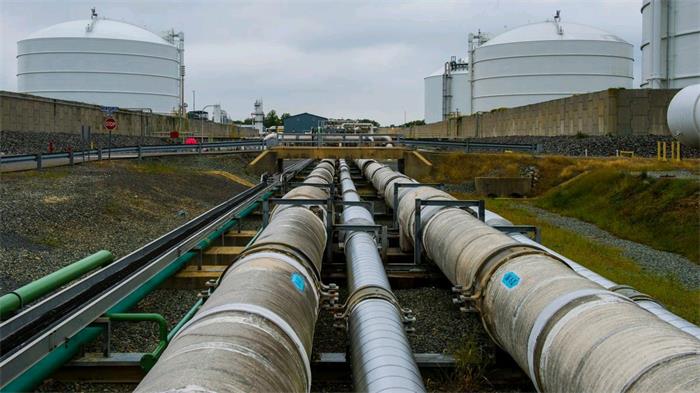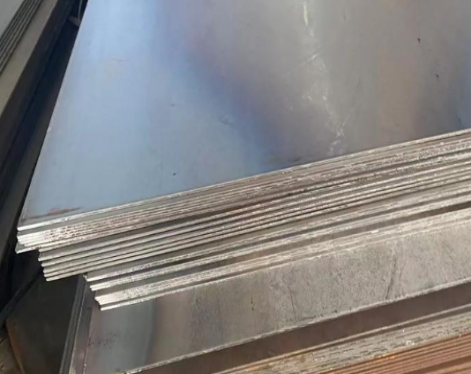Oil pipelines, as important equipment for oilfield production and oil and gas transportation, will suffer severe corrosion after long-term use. If the pipeline anti-corrosion work is not in place, it will not only reduce the service life of the oil pipeline, but also have a negative impact on the quality of oil products, and will cause serious environmental pollution.
The types of oil pipeline corrosion include chemical corrosion and electrochemical corrosion. The main reasons for the corrosion of oil pipelines are as follows:
1. The influence of the external environment
2. The influence of the change of the physical properties of the medium
3. The effect of temperature changes
4. The influence of construction factors
5. The impact of oil and gas

Anti-corrosion coatings for outer walls of pipes
1. Anti-corrosion coating for the outer wall of above-ground pipelines
The coating of the outer wall of the above-ground pipeline is subject to sunlight, temperature changes, rainwater and salt spray in coastal areas, etc., and may also be exposed to some corrosive gases such as sulfur dioxide, hydrogen sulfide and nitrogen dioxide under special conditions.The coating is required to have good water resistance, weather resistance, chemical resistance, salt spray resistance and mildew resistance. The anti-corrosion paint primers used on the outer walls of above-ground pipes are generally zinc-rich primers, chlorinated rubber primers or epoxy micaceous iron primers. In the past, the topcoat was mainly based on alkyd aluminum powder coating. In recent years, chlorine-containing polymer, acrylic, polyurethane, fluorocarbon resin and chlorine-based resin topcoats have also been widely used.
2. Anti-corrosion coatings for outer walls of underground pipes
The underground pipeline is in a soil solution environment, and the coating used on the outer wall is required to be resistant to water, acid, alkali, salt, microorganisms, rot-resistant animals and plants and plant root penetration, and requires a long-term protection period. At present, the anti-corrosion of the outer wall of the underground pipeline adopts the combination of coating and cathodic protection.The coatings mainly include coal tar enamel, factory prefabricated tape coating, asphalt/butyl adhesive plus crosshead extruded polyolefin coating, butyl adhesive plus double side extrusion polyolefin coating, Fusion-bonded coatings, multilayer epoxy/extruded polyolefin coatings, etc.
3. Requirements for anti-corrosion coatings for outer walls of pipes
As a special anti-corrosion coating for the outer wall of oil and gas pipelines, it needs to meet or have the following properties and requirements:
Effective electrical insulators; Effective moisture shielding; Good construction performance; Excellent durability and aging resistance; Good adhesion to the pipe surface; Good resistance to mechanical damage during handling, storage and installation; constant coating resistance; Good peeling resistance; easy to repair; Excellent environmental performance, non-toxic to human body.
Anti-corrosion coating for inner wall of pipeline
Compared with the anti-corrosion coating for the outer wall of the pipeline, the inner wall coating of the pipeline should have the following characteristics:Good anti-corrosion performance; long-lasting pressure resistance; convenience of coating construction; chemical stability; firm adhesion and bending resistance; sufficient wear resistance and hardness; heat stability; Commonly used pipe inner wall coatings mainly include thermoplastic and thermosetting rings, oxygen resins, polyurethanes, glass flake anti-corrosion topcoats and epoxy primers
Note: seamless pipes are mostly used for oil pipelines, because seamless steel pipes have hollow sections and are directly pierced and rolled from round steel without welds.Therefore, seamless pipes are widely used as pipelines for transporting fluids, such as transporting oil, natural gas, gas, water and certain solid materials.
The types of oil pipeline corrosion include chemical corrosion and electrochemical corrosion. The main reasons for the corrosion of oil pipelines are as follows:
1. The influence of the external environment
2. The influence of the change of the physical properties of the medium
3. The effect of temperature changes
4. The influence of construction factors
5. The impact of oil and gas

Anti-corrosion coatings for outer walls of pipes
1. Anti-corrosion coating for the outer wall of above-ground pipelines
The coating of the outer wall of the above-ground pipeline is subject to sunlight, temperature changes, rainwater and salt spray in coastal areas, etc., and may also be exposed to some corrosive gases such as sulfur dioxide, hydrogen sulfide and nitrogen dioxide under special conditions.The coating is required to have good water resistance, weather resistance, chemical resistance, salt spray resistance and mildew resistance. The anti-corrosion paint primers used on the outer walls of above-ground pipes are generally zinc-rich primers, chlorinated rubber primers or epoxy micaceous iron primers. In the past, the topcoat was mainly based on alkyd aluminum powder coating. In recent years, chlorine-containing polymer, acrylic, polyurethane, fluorocarbon resin and chlorine-based resin topcoats have also been widely used.
2. Anti-corrosion coatings for outer walls of underground pipes
The underground pipeline is in a soil solution environment, and the coating used on the outer wall is required to be resistant to water, acid, alkali, salt, microorganisms, rot-resistant animals and plants and plant root penetration, and requires a long-term protection period. At present, the anti-corrosion of the outer wall of the underground pipeline adopts the combination of coating and cathodic protection.The coatings mainly include coal tar enamel, factory prefabricated tape coating, asphalt/butyl adhesive plus crosshead extruded polyolefin coating, butyl adhesive plus double side extrusion polyolefin coating, Fusion-bonded coatings, multilayer epoxy/extruded polyolefin coatings, etc.
3. Requirements for anti-corrosion coatings for outer walls of pipes
As a special anti-corrosion coating for the outer wall of oil and gas pipelines, it needs to meet or have the following properties and requirements:
Effective electrical insulators; Effective moisture shielding; Good construction performance; Excellent durability and aging resistance; Good adhesion to the pipe surface; Good resistance to mechanical damage during handling, storage and installation; constant coating resistance; Good peeling resistance; easy to repair; Excellent environmental performance, non-toxic to human body.
Anti-corrosion coating for inner wall of pipeline
Compared with the anti-corrosion coating for the outer wall of the pipeline, the inner wall coating of the pipeline should have the following characteristics:Good anti-corrosion performance; long-lasting pressure resistance; convenience of coating construction; chemical stability; firm adhesion and bending resistance; sufficient wear resistance and hardness; heat stability; Commonly used pipe inner wall coatings mainly include thermoplastic and thermosetting rings, oxygen resins, polyurethanes, glass flake anti-corrosion topcoats and epoxy primers
Note: seamless pipes are mostly used for oil pipelines, because seamless steel pipes have hollow sections and are directly pierced and rolled from round steel without welds.Therefore, seamless pipes are widely used as pipelines for transporting fluids, such as transporting oil, natural gas, gas, water and certain solid materials.









